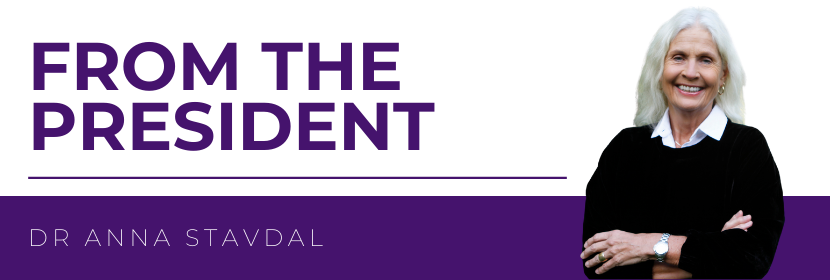From the President: October 2022
 Español Français 中文
Español Français 中文
While Action Still Can Matter
Our world is in deep trouble
– and so too are the Sustainable Development Goals.
UN Secretary-General António Guterres
at the Health Leader Political Forum, 2022
In our clinical work, Family Doctors are cautious; we don’t raise an alarm until and unless there is good reason to. Experience has honed our sense of timing; we’ve seen how too much focus too soon on risk and potential negative health outcomes may provoke indifference, even hopelessness, in our patients, undermining the very actions we’re seeking to help trigger. And, we know not to wait too long. We’re careful to shout out necessary warnings while there’s still time for our patients’ actions to mitigate dramatic outcomes. That is good clinical risk management.
The world in all its sectors is in a state of imbalance after more than two years of the pandemic. The corona virus has traversed the globe at great speed, a messenger knocking down every national door. It has put us on notice that, if we intend to transform ‘One Health’ from a mere slogan into a lived reality, we’ll need to take global action.
We stand by the promises we made when WONCA was founded 50 years ago, and by our unconditional commitment to the UN 2030 Agenda and the Sustainable Development Goals. After cautious consideration as clinical risk management experts, we have reached the conclusion on behalf of our organization that the moment for shouting out a global warning has come, while there’s still time to act to avert disaster. Thus we’re stating it clearly: Global Solidarity is now WONCA’S Number 1 Priority.
Yes, Globalization. But...
We cherish many aspects of globalization. It has shortened the distance between us, making it easier to share science, insights, products, and the arts. The Internet is a wonderful tool for advocacy, for spreading our messages broadly, encouraging and enabling people to team up and exert influence, together.
But…
Let’s be honest and acknowledge the inequities that globalization has exposed and inflamed. The huge gap between the rich and the poor persists and is growing far harder to impact, or to ignore. We recognize in the exponentially growing epidemic of Non-Communicable Diseases (NCDs), which pre-dates COVID, an apt, and awful, case-in-point of the interconnection between economics and health. NCDs increase inequities in all countries, but they hit the poorer countries the hardest.
Family Medicine and Primary Care are key in tackling NCDs. We have the skills to handle clinical complexity and to offer tailormade care. Yet, inequities are here too: our services are in shortest supply in precisely those countries where the need for them is greatest.
WONCA`s Vision: ‘Health for All and a Family Doctor for Every Family’
We are 131 member organizations spread over 111 countries in seven global regions.
Another global trend is emerging, however, this one in countries where Primary Care has traditionally been strong. Our services are being underfunded, especially as compared to hospital care. Family Doctors’ practices are increasingly overloaded while the recruitment of doctors to the Family Medicine Specialty is in decline.
And, make no mistake about it – there are huge differences among us.
WONCA`s fee structure is determined by the number of members in the area’s national colleges and associations. Consequently, High Income Countries (HIC) and Low and Middle Income Countries (LMIC) are impacted differently. The smallest member organizations and colleges, who pay less, are located in countries where Primary Care and Family Medicine services are scarce, as are available resources, both financial and human.
HIC member organizations contribute more to WONCA’s financial sustainability, based on their size. Yet they too have suffered during these last years, and the consequences for them keep coming. A predictable reaction to hard times is to turn inward, to take care of one’s own needs first. Thus, when revenues sink during a “conference drought” and financial accounts are looking bad, the larger HIC members may well resist subsidizing those member groups with fewer resources, and lower fees.
The smaller, LMIC colleges might protest that times of crisis are precisely when smaller groups’ internal business needs are more dire than those of the HIC groups, obligating the organization as a whole to allocate a larger share of the resources to them.
‘Us vs. Them’ Responses are Counterproductive
We are in it together. Wherever we’re situated along the continuum, the challenges we face are the results of the same global trends, and the solutions we can design will serve us all. Health care inequity is dangerous, associated with political instability and an increased risk of conflict. Big gaps between rich and poor spark rage, crime, wars, streams of refugees… Like the virus, inequity embroils us all.
As more of us have now seen first-hand, good public health does indeed depend on stable economic and ecological systems. It’s probably neither pure altruism nor the desire to see themselves as nice people that motivates the more privileged among us to stress equity. Healthy populations are more likely to generate stable societies. The pandemic exposed the clear and simple truth: ‘No one is safe until everyone is safe.’ Solidarity serves us all.
That puts equity at our core, as a mutual, shared responsibility. It makes Global Solidarity our top priority.
WONCA's voice supports coordinated, global action to strengthen Primary Care and promote Family Medicine. The stronger our unity, the stronger our voice.